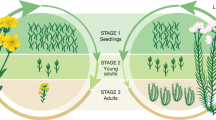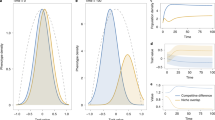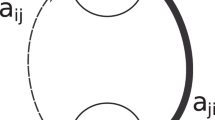Abstract
A CONTROVERSY1,2 has arisen over the interpretation of the results of an experiment by Ayala3 purporting to invalidate the “competitive exclusion principle” which was defined in terms of the Volterra competition equations. The invalidation was based on a competition experiment between Drosophila serrata and D. pseudoobscura where the two species were in apparent equilibrium, and from which the following parameters were calculated:  where K is the maximum number of individuals attainable when only one species is present, and N is the number actually observed at equilibrium. These parameters when estimated from Ayala's results were such that stability would not be predicted between the two competing species, and thus the competitive exclusion principle was rejected. Borowsky1 re-analysed the data, and concluded that a stable equilibrium was not present, and that the depression in yield of the mixed populations was caused by decreased fitness of each species from short term fluctuations in temperature that resulted in an environment optimal for neither species. Ayala subsequently2 replied to these criticisms.
where K is the maximum number of individuals attainable when only one species is present, and N is the number actually observed at equilibrium. These parameters when estimated from Ayala's results were such that stability would not be predicted between the two competing species, and thus the competitive exclusion principle was rejected. Borowsky1 re-analysed the data, and concluded that a stable equilibrium was not present, and that the depression in yield of the mixed populations was caused by decreased fitness of each species from short term fluctuations in temperature that resulted in an environment optimal for neither species. Ayala subsequently2 replied to these criticisms.
This is a preview of subscription content, access via your institution
Access options
Subscribe to this journal
Receive 51 print issues and online access
$199.00 per year
only $3.90 per issue
Buy this article
- Purchase on Springer Link
- Instant access to full article PDF
Prices may be subject to local taxes which are calculated during checkout
Similar content being viewed by others
References
Borowsky, R., Nature, 230, 409 (1971).
Ayala, F. J., Nature, 231, 112 (1971).
Ayala, F. J., Nature, 224, 1076 (1969).
De Wit, C. T., Versl. Landbouwk. Onderz., 66, 1 (1960).
Schutz, W. M., Brim, C. A., and Usanis, S. A., Crop Sci., 8, 61 (1968).
Harper, J. L., in Genetics Today (Proceedings of the XI International Congress of Genetics), 2, 465 (1965).
Putwain, P. D., Antonovics, J., and Machin, D., Evolution, 21, 638 (1967).
Harper, J. L., J. Ecol., 55, 247 (1967).
Weisbrot, D. R., Genetics, 53, 427 (1966).
Dawood, M. M., and Strickberger, M. W., Genetics, 63, 213 (1969).
Seaton, A. P. C., and Antonovics, J., Heredity, 22, 19 (1967).
Putwain, P. D., thesis, Univ. Wales (1968).
Ayala, F. J., in Essays in Evolution and Genetics in Honor of Theodosius Dobzhansky, 121 (edit. by Hecht, M. K., and Steere, W. C.) (North-Holland, Amsterdam, 1970).
Williams, M. B., J. Theoret. Biol., 29, 343 (1970).
Author information
Authors and Affiliations
Rights and permissions
About this article
Cite this article
ANTONOVICS, J., FORD, H. Criteria for the Validation or Invalidation of the Competitive Exclusion Principle. Nature 237, 406–408 (1972). https://doi.org/10.1038/237406a0
Received:
Issue Date:
DOI: https://doi.org/10.1038/237406a0
This article is cited by
Comments
By submitting a comment you agree to abide by our Terms and Community Guidelines. If you find something abusive or that does not comply with our terms or guidelines please flag it as inappropriate.



